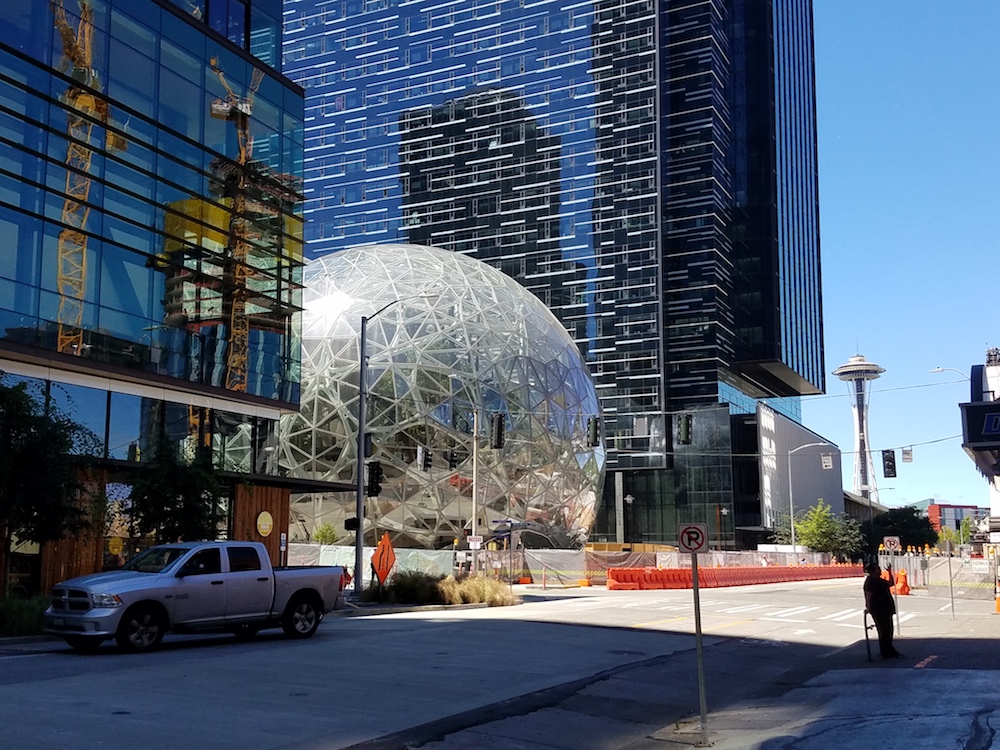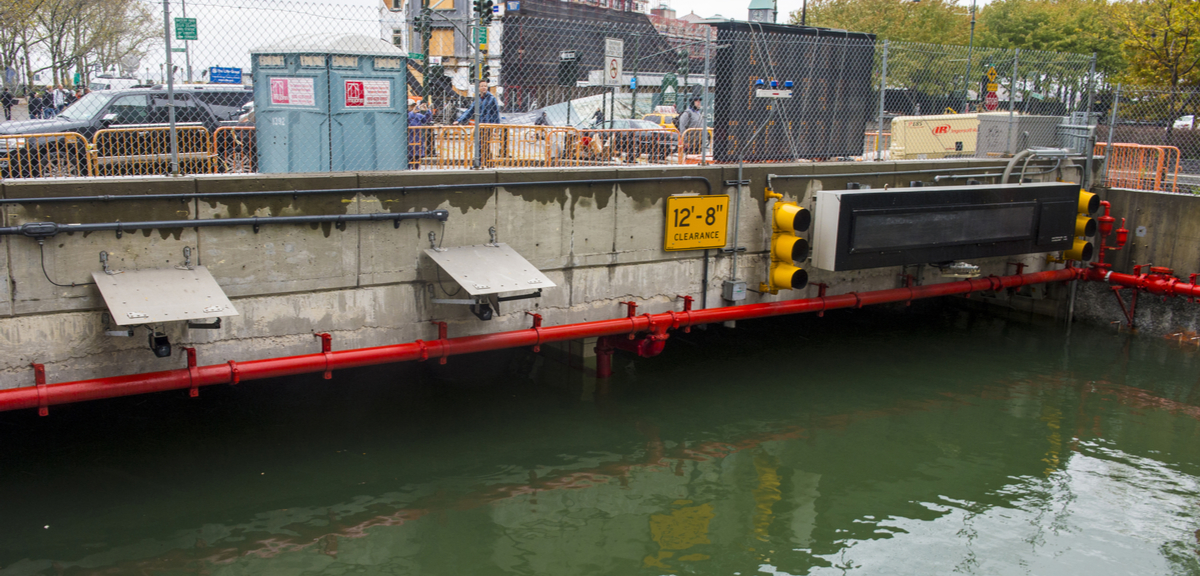Connecting state and local government leaders
ANALYSIS: Suitors seeking Amazon’s 2nd headquarters should ask themselves: How resilient is their city or region?
SEATTLE — When Amazon.com, Inc. unexpectedly announced last week that it was seeking to build a second headquarters campus somewhere outside its home base in the Pacific Northwest’s largest city, it sent municipal leaders and regional economic development boosters across North America into overdrive to pull together proposals to help woo one of the world’s largest tech companies to their area.
Amazon has helped transform Seattle’s skyline and commercial real estate landscape, building new office towers in the Denny Triangle and South Lake Union neighborhoods and gobbling up square footage elsewhere in the central business district. The company has helped make Seattle one of the nation’s fastest-growing cities.

As The Seattle Times reported in August, Amazon’s footprint in Seattle currently covers 8.1 million square feet and is expected to grow to 12 million square feet in five years. The company’s second headquarters campus, wherever it ends up, would be a “full equal” to Seattle and accommodate 50,000 workers.
There’s been plenty of passionate discussion in the Emerald City in recent days about what Amazon’s headquarters announcement signals about the state of economic development, growth and the business climate in Seattle, where the impacts of the tech boom have been acutely felt.
But there’s something very timely that’s been mostly missing from that conversation: Resiliency.
Amazon’s wish list for a second headquarters campus location included requirements for a metro area with at least 1 million residents, robust local transit options and an international airport with good connections to Seattle, San Francisco, New York City and Washington, D.C. Beyond that, Amazon hasn’t gone into much detail about its motivations.
However, leaders at the logistics-obsessed company would be foolish to overlook something not specifically spelled out on its wish list: How vulnerable is your city or region to natural disasters and other major disruptions?
As Hurricanes Harvey and Irma have dominated U.S. headlines in recent weeks, it’s an important question for a corporate titan whose current home is in a city and region that’s very vulnerable to seismic activity, including a future magnitude 9.0 earthquake along the Cascadia Subduction Zone off the coasts of Oregon and Washington state.
Lessons From 9/11 and Superstorm Sandy
Sixteen years ago, the nation’s financial sector was rocked by the Sept. 11, 2001, terrorist attacks, which destroyed the World Trade Center in Lower Manhattan. The 9/11 attacks, which killed nearly 3,000 people, immediately sparked questions on Wall Street about whether it was so wise to have so much of the nation’s financial infrastructure clustered in New York City.
In the immediate near term following the 9/11 attacks, many of the large financial firms impacted by the destruction in Lower Manhattan relocated their operations to satellite locations in New Jersey and elsewhere in the New York City area.
Longer term, some of those firms shifted other operations outside the New York City region entirely, a strategy that paid off in 2012 when Superstorm Sandy flooded parts of Lower Manhattan, including vital subway and roadway infrastructure and disrupted the nation’s largest metropolitan area.

Fast forward to 2017: As Hurricane Irma approached Florida this weekend, Bloomberg News noted that many financial services companies “expanded into Tampa as a risk management strategy to spread out exposure” following the 9/11 attacks.
For Amazon, expanding to include a second headquarters city may make economic sense to accommodate the company’s voracious growth, but it also helps to “spread out exposure” to the shock that will come following the next major earthquake in the Pacific Northwest. As Seattle recovers from that quake, whenever it may come, the second headquarters would step up and offer operational redundancy.
It makes sense for a company that touts disaster recovery as an important feature of its cloud services for public- and private-sector organizations.
Long-Term Economic Development Concerns
While the Tampa Bay region seemed to escape its worst-case scenario hurricane scenario with Irma, it remains the nation’s largest city with the most significant storm surge threat due to its low-lying coastal geography.
Tampa’s economic development boosters have touted the city’s business- and tech-friendly environment in recent years, but Irma has been a reminder that they face the distressing reality that years of investment and growth could be easily swamped by one debilitating storm. The same goes for Miami, which also escaped its worst-case storm scenario with Hurricane Irma.
In Texas, the nation’s fourth-largest city has not been as lucky.
Following Hurricane Harvey’s prolonged rainfall and crippling flooding, Houston is now grappling with the realities of its own disaster risk, resiliency challenges and the difficulties that come with a massive regional economic disruption.
Civic leaders, especially those in low-lying coastal cities grappling with sea-level rise, have to think about whether their long-term disaster risk could make some companies think twice about locating their operations there. Flood-vulnerable cities like Norfolk or New Orleans can’t realistically ever promote themselves as great places for tech companies to locate data centers.
In New England, one might wonder whether leaders at General Electric might someday regret their decision to relocate their corporate headquarters from Hartford, Connecticut, to Boston’s Seaport District, which sits on land reclaimed from the harbor that’s vulnerable to long-term sea-level rise.
Boston not only faces significant challenges from climate change, hurricanes and nor’easter storms, but also earthquakes. In 1755, a quake with an approximate magnitude of 6.0 struck off Cape Ann, Massachusetts when Boston’s population and built environment was far smaller than it is today. If the same quake were to happen in 2017, Boston would be brought to its knees, hobbled by liquefaction that would undermine buildings built on land reclaimed from the harbor and Charles River.
Every city and region faces its own localized risk, some more than others. The tough challenges: How do you plan for a disruption that may not necessarily come in your lifetime, like a large earthquake or a direct hit from a hurricane? How do civic leaders promote their cities and regions when they know that they’re one natural disaster away from a subsequent economic disaster?
That’s where resiliency planning is vitally important for not just for states and local jurisdictions but also companies thinking about where to position their human resources and operational assets. The smart ones know that there are many what-ifs and worst-case scenarios they simply can’t afford to overlook.
Michael Grass is Executive Editor of Government Executive’s Route Fifty and is based in Seattle.

NEXT STORY: From the workbench to the sky: 3-D printed drones




